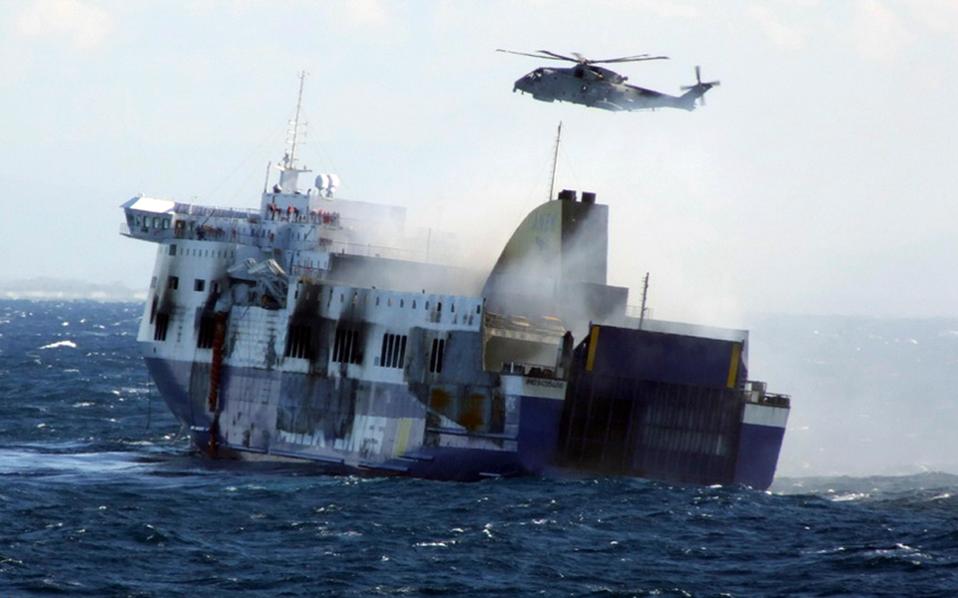Questions still hang over Norman Atlantic disaster

It was the early hours of December 28, 2014. The Norman Atlantic ferry boat was on its way from the Greek port of Patra to Ancona in Italy, via Igoumenitsa in northwestern Greece, when a fire broke out on the car deck, soon turning the ship unto a flaming stage of tragedy. Eleven dead, 18 missing and hundreds of passengers and crew (over 500 in total) were at the mercy of the blaze in the middle of the Adriatic, as the high winds whipped icy waves and rain about the vessel. There was no emergency protocol or fire-extinguishing mechanism. Compounding the panic, there was a breakdown in communication between the authorities in Italy and Greece.
One year later, the blackened hull of the Norman Atlantic is still tied up at the port of Bari and the investigation by Italian judicial authorities is moving at a remarkably slow pace. Investigators still have not searched the entire ship to find the remains or other evidence of victims trapped on the car deck. Prosecutors will be calling for testimony from two representatives of ANEK Lines, the Greek company that had leased the ferry, an employee responsible for loading, the Italian owner Carlo Visentini, Captain Argilio Giacomazzi and seven crew members. The suspects face charges of provoking a shipwreck, manslaughter by negligence, numerous counts of causing bodily harm and numerous counts of negligence. The investigation has been extended for another six months.
Most of the dead, as well as the passengers that made it off the boat alive, who suffered injury and psychological trauma, were from Greece, yet here nothing has been done.
“The state has shown almost no interest. Truck owners lost their vehicles in the fire, after having paid insurance, road tax and other expenses for 2015. Owners and drivers were left without a job but they were still obliged to pay their social security fees,” says Apostolos Kenanidis, head of the OFAE federation of Greek truckers. “ANEK initially offered compensation of 25,000 euros to each passenger, which later became 35,000 euros. Our members were offered an additional amount for the trucks, though this is not sufficient to replace the destroyed vehicles. Several members of OFAE have not settled with the company and are seeking compensation.”
Kenanidis stresses that there were not enough crew members aboard the Norman Atlantic. “We had to manuever in the garages ourselves,” he says.
“A crew of 56 is unacceptable on a ship like that, traveling with so many passengers and cargo,” agrees Antonis Dalakogeorgios, president of the Panhellenic Commercial Sailors’ Union. “Also, Italian ferry boats do not have a sailor whose position is in the garages to notify of anything that may be happening as Greek ships have.”
If there is one way to describe the stance of the Greek state to the tragedy it is a complete absence of interest or care for the families of the victims and surviving passengers. No assistance was offered, neither monetary nor psychological, and, most importantly, nothing was done to speed up the judicial process so that victims could have their day in court. The Ministry of Shipping relegated the case to the service responsible for investigating maritime disasters without taking a further interest. That service sent passengers questionnaires on the incident just last month.
How can such indifference on the part of the Greek authorities be explained? It was a huge maritime tragedy on a ship leased by a Greek company, with hundreds of Greek passengers on board and the fire broke out in waters for which the Greek authorities are responsible. And so many questions remain unanswered. Was there any communication between the bridge and the Maritime Rescue Coordination Center of the Hellenic Coast Guard? Why did the ferry continue sailing for Italy instead of turning back to the Greek shores, which were closer, or Albania?
‘Total chaos’
“We were living through hell. The uncertainty heightened our fear. Night fell again and the helicopters had stopped coming. The fire raged below, the floors were burning, people had already been lost in the garages or at sea. We were wet from the fire hoses and rain, and the wind was icy, blowing at gale force.” Rania Thireou is calm as she speaks to Kathimerini, but the anguish and anger she feels as a passenger of the Norman Atlantic rings in her voice.
“Like many other passengers, we had booked tickets to sail on another ANEK ferry, the Hellenic Spirit, which we were familiar with. Suddenly we were shown onto the Norman Atlantic without explanation, even though we had paid 380 euros from two people, a cabin and the car. That’s the kind of respect they showed passengers,” says Yiannis Vassalos.
No alarm
It was Sunday shortly after 5 a.m. when a quiet announcement came over the ship’s intercom calling, in English, on the crew to get into position. Though quiet, it stirred the sleeping passengers, who woke up to a nightmare that was to last 35 hours – and still ongoing for those who lost their loved ones.
“We were worried and came out the cabin to encounter total chaos,” says Thireou. “There was no alarm; that much was absolutely clear. We just saw a girl from the crew banging on doors and telling people to get out. There was no muster station and no plan. By the time we made it onto the deck, the fire had spread, burning life rafts and life vests on one side.”
“The crew was nowhere to be seen. Life jackets were being distributed to passengers by some truck drivers who had used an ax to smash open a storage cupboard. Even in the towing effort later, three Greek truck drivers risked their lives but not a one from the crew,” says Vassalos.
From the start of the fire, there was nothing but confusion. Three Italian crewmen decided to release a life boat but witnesses say they appeared not to be sure how.
“A crowd had gathered and were pushing to get on. When the fire got dangerously close, panic broke out and many ended up in the sea. Some of them drowned,” remembers Vassalos.
Running engines
“I don’t have any plugs!” The sailor, holding a bunch of cables in his hands, was addressing a Greek officer next to the ramp as the Norman Atlantic was readying to tie up at Igoumenitsa. Vassalos, who was planning to leave the boat briefly to do some shopping, witnessed the incident.
Refrigerated trucks need to have a power source at all times to protect their cargo. For safety reason, ferry boats forbid them from keeping their engines running in the garages so they are plugged into the central power source. Witnesses have said that the Norman Atlantic was not equipped with enough plugs for the number of refrigerated trucks it was carrying so it allowed them to travel with running engines. This may be the explanation behind the spark that caused the deadly blaze.
In a fragment from the Norman Atlantic’s data recorder that was published by Italian newspaper Il Fatto Quotidiano, a sailor is heard informing the bridge at 5.17 a.m. (Greek time) that he had seen a truck with its engine running in Garage 4 that was spewing smoke.
As the hours passed and the rescue operation stalled, the passengers grew increasingly anxious. A group “invaded” the half-scorched bridge to find shelter from the elements and get a picture of what was going on.
“It was almost midnight on Sunday. I couldn’t hold back; I ran to the captain in a complete state and started shouting in his face, ‘There are 300 people here who will get hypothermia and you’re worried about saving the ship!’ They had not brought blankets or water,” remembers Thireou.
Some supplies appeared later and the rescue resumed with more helicopters taking passengers off to safety.
“There was a complete communication breakdown. I was on the list of missing passengers until I reached Athens on December 31. The more I think of our ordeal, the more ashamed I am because they treated us and keep treating us like garbage,” says Vassalos.





